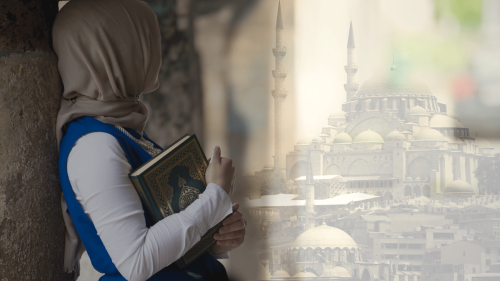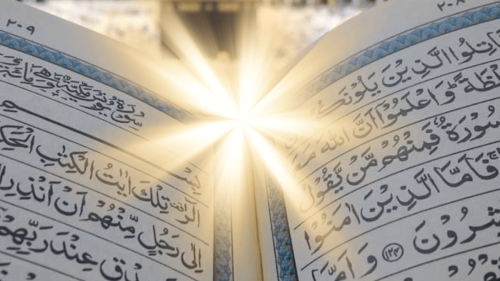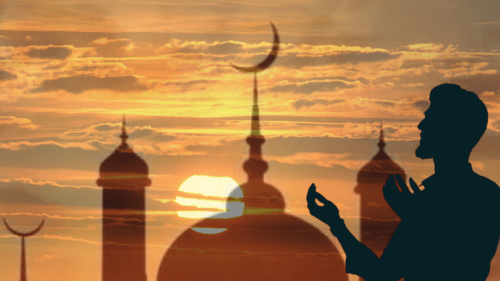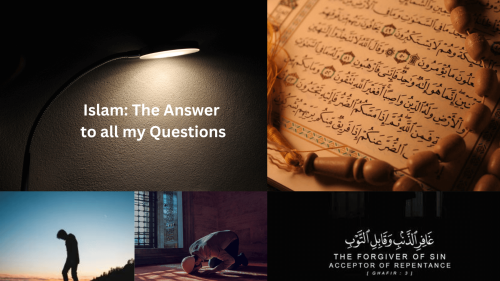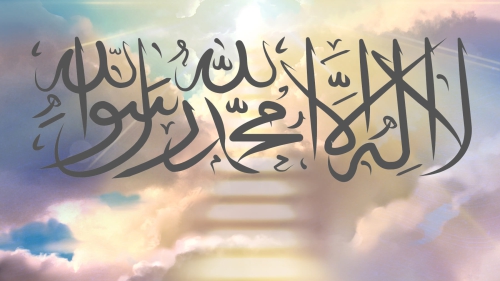| Salam, Zara.
Thank you for your questions.
I wish first to commend you for expressing your feelings and asking questions instead of continuing to live in doubt.
Asking, learning, and sincere questioning, without being overly cynical, is not only healthy, but also encouraged in the Quran. It is certainly the first step in the right direction.
It is encouraging that you distinguish between Muslim cultural practices and proper [or normative] Islam. Some cultural perceptions and practices among Muslims may not be consistent with Islam and in some cases, against its true meaning and teachings. This makes it necessary to learn about authentic Islam as the criterion to evaluate how Islamic Muslim perceptions and actions are.
Equally encouraging is that you have "become more interested in following" your faith properly. It is not surprising at all that a young person like you reflects on such type of issues and questions.
Some of these questions are common to every human, especially in the maturing stage of his or her life. They relate to the process of formation on one's world view.
Who created this universe? Who am I? Why am I here on this planet? Do I have any mission on earth or do I just live and die like all other living beings? What will happen to me after I die? Is there such thing as eternal afterlife? If yes, what does it look like?
At the heart of these questions is the core question: do I believe in Allah  or not? Even if I believe in Allah, what is my relationship with Him? Do I owe anything to Him? What are the consequences of believing in Him and obeying Him or rejecting Him and disobeying Him? or not? Even if I believe in Allah, what is my relationship with Him? Do I owe anything to Him? What are the consequences of believing in Him and obeying Him or rejecting Him and disobeying Him?
It is this question about "Allah" that has always been the core message of all prophets in human history. Any other question is based on this foundation. It is the most significant determinant of one's basic identity.
Since you believe in Allah  already, I will move directly to address some of your specific questions. already, I will move directly to address some of your specific questions.
| 1. How do we know that Islam is the true religion, a claim that is made also by followers of all religions?
Islam, in essence, is the message that Allah  revealed to all prophets in history. The very term means to achieve peace with Allah, the One and Only Creator and Sustainer of the universe, inner peace, and peace and harmony with all the creation of Allah. Creation includes humans, animals, vegetation and the environments at large. revealed to all prophets in history. The very term means to achieve peace with Allah, the One and Only Creator and Sustainer of the universe, inner peace, and peace and harmony with all the creation of Allah. Creation includes humans, animals, vegetation and the environments at large.
Such a comprehensive concept of peace embraces peace during our earthly lives and the ultimate and perfect peace in the life to come. Realization of peace requires an unqualified firm belief in Allah  , deferring to His infinite and perfect wisdom and willingly committing one's life to serve Him. , deferring to His infinite and perfect wisdom and willingly committing one's life to serve Him.
True commitment to Allah is manifest in obeying His commands, trusting His guidance, and fulfilling one's role as Allah's trustee while one is here on earth.
Our relationship with Allah  should not be motivated by fear - of punishment due to our rebellion and infraction - alone, or by desire for His rewards in both worlds alone. should not be motivated by fear - of punishment due to our rebellion and infraction - alone, or by desire for His rewards in both worlds alone.
On a deeper and spiritual level, we should be motivated by the love of Allah, acknowledging His infinite mercy, which is manifest in incalculable ways, and the readiness to translate that love in concrete terms in our moral decisions and choices as best as we can as vulnerable humans.
In making these conscious decisions or choices, we still need to be humble and never think that we are doing a favor to our Creator by believing in Him and obeying Him. In fact, our obedience does not benefit Him in any way nor does our disbelief harm Him in the least. The true beneficiaries of belief and obedience are us, the humans. We are doing favor to ourselves by obeying Allah.
Likewise, if we reject belief in Allah  and/or choose to disobey Him, we are the real losers. For example, when we do our daily prayers regularly and correctly - not just ritually -, we keep ourselves clean, spiritually, and physically, we get a brief but healthy and refreshing break from our busy schedules, renew our energies, reduce our stress, and feel connected. and/or choose to disobey Him, we are the real losers. For example, when we do our daily prayers regularly and correctly - not just ritually -, we keep ourselves clean, spiritually, and physically, we get a brief but healthy and refreshing break from our busy schedules, renew our energies, reduce our stress, and feel connected.
As regular and repeated meals provide us with the necessary nourishment of the body, regular prayers provide us with a more necessary nourishment of our souls.
Likewise, when we disobey Allah by partaking intoxicants or committing adultery or fornication, it is again we who are hurting ourselves, and in a way "punishing" ourselves by destroying our minds or contracting devastating venereal diseases , including AIDS.
The following two verses from the Quran sum up the above paragraph:
 |
| Whoever accepts guidance does so for his or her own good; and whosoever strays does so at his or her own peril, nor do We [Allah] punish until We have sent a messenger (Al-Israa' 17:15) |
 |
 |
| ...Whoever chooses to follow the right path does so for his or her own good. Say [O Muhammad] to whoever deviates from it, 'I am only here to warn.' Say, 'Praise belongs to Allah: He will show you His signs so that you will recognize them.' Your Lord is never unmindful of what you all do}* (An-Naml 27:92-93) |
This core message of Islam has been at the heart of the teachings of all prophets, who were all Muslims in the generic meaning explained earlier. Their common religion was Islam as well. Through the final prophet, Muhammad  , that message was completed, restored and preserved intact. , that message was completed, restored and preserved intact.
There are elements of truth and goodness in all revealed religions in spite of some doctrines that were incorporated with the original prophetic teachings. One can not properly examine truth claims without studying them carefully and see what appeals to one's heart and mind. |
2. Is being a practicing Muslim contrary to feeling happy and enjoying life?
| Islam is not a mere set of taboos on do's and don'ts. Nor are rules of morality straight jackets and barriers from lawful and wholesome enjoyment of life. In the Quran and Hadith, we find numerous references to the functionality and beauty of the creation of Allah that are created for our benefit and enjoyment.
Picnics, sports, and other hobbies are encouraged so long as there is no violation of Islam's moral code. As such Islam does not mean "no fun", unless we mean by "fun", I do whatever I "feel like" doing without any restraint or guiding rules.
Likewise, if indeed I believe in Allah  , defer to His infinite wisdom and above all, reciprocate His love with my obedience, then I should be ready to make reasonable sacrifices. Some such sacrifices include resisting the tendency to do everything that "I feel like" doing, even if Allah tells me that it is forbidden. , defer to His infinite wisdom and above all, reciprocate His love with my obedience, then I should be ready to make reasonable sacrifices. Some such sacrifices include resisting the tendency to do everything that "I feel like" doing, even if Allah tells me that it is forbidden.
Sacrifice may also require me to resist the temptation to disobey Allah and refuse to abide by His guidance because "I do not feel like" doing it, such as prayers and other mandatory duties.
As to your remarks about hijab, I must be honest and forthright with you and say clearly that it is mandatory on every adult female Muslim. In fact, Muslim men also have dress rules for modesty as well.
However, understanding Islam, strengthening one's faith, abstaining from major sins and practicing the most important pillars of Islam take precedence over hijab. It is the decision to commit oneself to Allah  and re-connect with Him that help overcome some of the barriers to do good. and re-connect with Him that help overcome some of the barriers to do good.
Such barriers may be psychological, social like peer pressure and other difficulties. Let us put first things first and by the grace of Allah, other goodness will follow. |
3. What is the nature of the Afterlife?
For a true Muslim, belief in the Afterlife is inseparable from the belief in Allah  . Both relate to believing in the unseen. We believe in Allah, not only on the bases of scientific and logical reasoning, but also in response to the deep yearning in the human soul to connect with what is beyond it and beyond the universe at large. . Both relate to believing in the unseen. We believe in Allah, not only on the bases of scientific and logical reasoning, but also in response to the deep yearning in the human soul to connect with what is beyond it and beyond the universe at large.
As humans, we do not even fully understand all aspects of our physical and tangible world in spite of all the scientific and logical tools in our hands. Yet, the physical world is not all that exists. There is certainly an intangible and indiscernible spiritual world that we feel but can not reduce to such conventional tools of discovery.
The only way of acquiring some glimpse of it is through authentic revealed information that come from Allah. The full reality of what is going to happen in the afterlife is beyond our perception and earthly nature. Yet Allah willed to communicate to us a glimpse of the consequences of our moral choices while on our limited and finite earthly journey.
The only means of revelatory communication is through terms and images that we can relate to, even though the full reality of such a future existence is impossible to fully communicate. It is with this background that the Prophet Muhammad  taught that Allah prepared for His faithful servants in Paradise what no eye has ever seen, no ear has ever heard, and no thought ever occurred to a human mind. Read, if you will, the Quranic verse that says: taught that Allah prepared for His faithful servants in Paradise what no eye has ever seen, no ear has ever heard, and no thought ever occurred to a human mind. Read, if you will, the Quranic verse that says:
 |
| No soul knows what joy is kept hidden in store for them as a reward of what they have done (As-Sajdah 32:17) |
With this in mind, it is impossible that there would be any toil, suffering, deprivation, grief, or boredom in Paradise. All such earthly concepts are totally irrelevant to the assured blissful joy and ever renewed delights and surprises in Paradise.
As to the punishment of those who reject faith in Allah  and deliberately disobey Him, we must remember the following: and deliberately disobey Him, we must remember the following:
- There are always consequences for any decision we make; positive or negative.
- Allah is Just. This implies that the do-gooder and the wrongdoer can not be equated. A student who did virtually nothing in a course should not be getting an "A" like others who legitimately earned that mark.
- If brutal people who commit genocide and crimes against humanity will not be held responsible in the Afterlife for their crimes and brutality, or even mere thanklessness and rejection of belief in Allah, then there will be no moral restraints from committing evil. Likewise, if there is no ultimate reward for virtue, goodness and kindness, then the motivation for goodness may be weakened, to say the least.
|
|
4. Allah  does not enjoy punishing people in the fire. As Allah says in the Quran : does not enjoy punishing people in the fire. As Allah says in the Quran :
 |
| Why should Allah make you suffer torment if you are thankful and believe in Him? Allah always rewards gratitude and He knows everything (An-Nisaa' 4:147) |
|
May Allah  help us all be grateful to Him and shower His mercy upon us all and help us understand, exemplify and convey His beautiful message that brings joy to our hearts in this temporary earthly life and more importantly in the eternal life to come. help us all be grateful to Him and shower His mercy upon us all and help us understand, exemplify and convey His beautiful message that brings joy to our hearts in this temporary earthly life and more importantly in the eternal life to come.
It is in this eternity that the line will be drawn between the believers, the skeptics, the cynical and the outright rejecters of truth. May Allah  not only save us in the day where there is no authority but His, but also guide humanity to His straight path. not only save us in the day where there is no authority but His, but also guide humanity to His straight path. |















